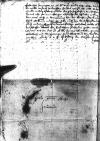Kegenwertiger czeiger, der erbar ⌊Cristof Wantkoufsky⌋, unser underthann, / hat uns undertheniglichenn czuvorsthen gebenn, / wie im einer sei seiner mutter swester shonn, / der ein pfharher zur ⌊Leisow⌋ im Grosem Werder gewesen, kurtzlich interstatus vorstorbenn sei, / und darneben angezeigt, das ehr mit seinem written over nn⌈nnmm written over nn⌉ bruder die nehesten erbenn zu den vorlassenen gutternn werenn. Dieweil aber nu gedochter prister ane testament vorscheidenn, / und also die di paper damaged⌈[i]i paper damaged⌉sposition der gu seiner gutter an den hochwirdigenn in Got, unsernn freuntlichen, lieben brudernn, / hern ⌊Tidemannu(m)⌋, bischoffen zu ⌊Colmenshe⌋, gekom(m)en, / durch welche(n) auch dem officiali zu ⌊Marienburg⌋ die aufzuteilenn bovelich geschenn, / und die vorlassenen schulde, so noch wegen des vorstorbenen einzumanen der erbnamen zugeeignet, / hat genanter ⌊Wantkeufsky⌋ uns g ferner vormeldet, / wie das gedochter pfharher zur ⌊Leisow⌋ etwan ein gut ader dorf, / nicht f bei ⌊Dirsow⌋ gelegen, im an in von [se]inen eltern on the margin⌈im an in von se hidden by binding⌈[se]se hidden by binding⌉inen elternim an in von [se]inen eltern on the margin⌉ sol vor XIIII hundert m(arken) ungefer vorkauft / haben /, und von solchem gelde czwelfhundert m(arken) zu trauer handt / bei dem vorstorbnem written over nn⌈nnmm written over nn⌉ pfarher zu Dirsow abgelegt habenn, / der wo von welchem gelde der pfarher viel hundert m(arken), wie E(wer) H(erlichkei)t Wantkoufsky borichten superinscribed in place of crossed-out t⌈tnn superinscribed in place of crossed-out t⌉ wirdt, auf auch der pfarher von Dirsow im seinem letzsten bokant hat on the margin in place of crossed-out auf and then crossed-out⌈auf auf auch der pfarher von Dirsow im seinem letzsten bokant hat auf auch der pfarher von Dirsow im seinem letzsten bokant hat on the margin in place of crossed-out auf and then crossed-out⌉, hin und widder ausgeligenn das [...] text damaged⌈[...][...] text damaged⌉ zu Dirsow sein. Dieweil den nu zu solchem gelde und schulden W ⌊Christof Wantkoufsky⌋ mit seinem bruder die nehesten paper damaged⌈[n]n paper damaged⌉ sein superinscribed in place of crossed-out sein⌈sein sein sein superinscribed in place of crossed-out sein⌉, / dassulbe auch ihnen als den erbnamen durch hochgedochten hern ⌊bischof⌋ zu ⌊Colmenshe⌋ zueigenet, / und die ihe paper damaged⌈[e]e paper damaged⌉nigen, den solchs gelt geligenn, under E(wer) H(erlichkei)t gess gesessenn,  AAWO, AB, D. 70, f. 393v g written over G⌈Ggg written over G⌉elanget derwegen an E(wer) H(erlichkei)t unser freuntliche bitte, / diesulbe wolte unserm underthan in dem, wozu ehr recht haben wirdt, nicht absthenn, / sunder im gunstiglichenn vorhelffenn, damit ehr s... illegible⌈...... illegible⌉ ane langen aufczug die schulde / nebenn dem, was noch in vorwarung bei der kirchen zur ⌊Dirsow⌋ liget, bokom(m)en muge. / Wo ihm auch von hantschriften / ader hidden by binding⌈[er]er hidden by binding⌉ sunst anderen beweisen etzwas superinscribed⌈etzwasetzwas superinscribed⌉ vorenthalten wurden, / wolte E(wer) H(erlichkei)t vorschaffen, auf das superinscribed in place of crossed-out damit⌈damit auf das auf das superinscribed in place of crossed-out damit⌉ in diesulbenn zuhanden geben werden hidden by binding⌈[n]n hidden by binding⌉. Wo wir uns den das zu E(wer) H(erlichkei)t, / die wir gotlichen genaden hidden by binding⌈[n]n hidden by binding⌉ bovelenn mit langweriger gesuntheit bovolen, / vorshen wollen.
AAWO, AB, D. 70, f. 393v g written over G⌈Ggg written over G⌉elanget derwegen an E(wer) H(erlichkei)t unser freuntliche bitte, / diesulbe wolte unserm underthan in dem, wozu ehr recht haben wirdt, nicht absthenn, / sunder im gunstiglichenn vorhelffenn, damit ehr s... illegible⌈...... illegible⌉ ane langen aufczug die schulde / nebenn dem, was noch in vorwarung bei der kirchen zur ⌊Dirsow⌋ liget, bokom(m)en muge. / Wo ihm auch von hantschriften / ader hidden by binding⌈[er]er hidden by binding⌉ sunst anderen beweisen etzwas superinscribed⌈etzwasetzwas superinscribed⌉ vorenthalten wurden, / wolte E(wer) H(erlichkei)t vorschaffen, auf das superinscribed in place of crossed-out damit⌈damit auf das auf das superinscribed in place of crossed-out damit⌉ in diesulbenn zuhanden geben werden hidden by binding⌈[n]n hidden by binding⌉. Wo wir uns den das zu E(wer) H(erlichkei)t, / die wir gotlichen genaden hidden by binding⌈[n]n hidden by binding⌉ bovelenn mit langweriger gesuntheit bovolen, / vorshen wollen.
 AAWO, AB, D. 70, f. 393v g written over G⌈Ggg written over G⌉elanget derwegen an E(wer) H(erlichkei)t unser freuntliche bitte, / diesulbe wolte unserm underthan in dem, wozu ehr recht haben wirdt, nicht absthenn, / sunder im gunstiglichenn vorhelffenn, damit ehr s... illegible⌈...... illegible⌉ ane langen aufczug die schulde / nebenn dem, was noch in vorwarung bei der kirchen zur
AAWO, AB, D. 70, f. 393v g written over G⌈Ggg written over G⌉elanget derwegen an E(wer) H(erlichkei)t unser freuntliche bitte, / diesulbe wolte unserm underthan in dem, wozu ehr recht haben wirdt, nicht absthenn, / sunder im gunstiglichenn vorhelffenn, damit ehr s... illegible⌈...... illegible⌉ ane langen aufczug die schulde / nebenn dem, was noch in vorwarung bei der kirchen zur 
